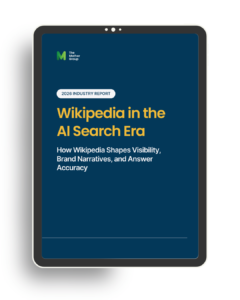TL;DR: A Wikipedia page is the most straightforward way to reach AI search visibility — we know it shapes how Google AI Overviews, ChatGPT, and other LLMs describe your brand. Assess and analyze your presence on Wikipedia, always remembering that optimizing Wikipedia for AI search isn’t about barreling in, ready to copy+paste your latest news releases and official corporate history. It’s about managing your brand’s knowledge footprint in alignment with Wikipedia’s guidelines and standards.
Table of Contents
AI Search is Reshaping Visibility
Artificial intelligence is changing not only how people search, but also how they digest information. From Google AI Overviews to ChatGPT, Bing Copilot, and Perplexity, people are increasingly getting answers not from a list of blue links, but from machine-generated summaries. For Marcom and PR leaders, the challenge isn’t just showing up — it’s about showing up everywhere you need to be, and in the right way.
So, where is that? We all know these summaries synthesize information from sources across the internet, but what often gets overlooked is just how much influence Wikipedia has on these results. Wikipedia is one of the most frequently cited sources across all AI systems, making it a crucial factor in how your brand appears in the new search landscape.
Why do AI and LLMs Rely on Wikipedia?
Wikipedia is one of the most widely used sources of facts, context, and entity-level information for AI and LLMs. In fact, it is part of nearly every LLM training set, including The Pile. What makes it so special? There are a few factors:
- Global authority: Wikipedia consistently ranks among the top 10 most visited websites worldwide. It’s widely trusted as a fact-based resource. Occasional vandalism occurs (sometimes on, frankly, impressive scales), but doesn’t do enough damage to even dent the site’s ever-expanding authority. Even Google pays Wikimedia for high-speed content feeds to keep its Knowledge Graphs and AI Overviews fresh.
- Search result dominance: Wikipedia pages frequently dominate search results for countless keywords (people, places, and things), making it an obvious choice for AI tools that want to provide optimal outputs.
- Machine-readable: Thanks to its demand for citations, and its heavy-use of markup and cross-linked articles, Wikipedia is especially well-suited for machine parsing and retrieval. In addition, Wikidata and DBpedia transform Wikipedia’s structured content into machine-readable knowledge graphs. Search engines and AI models query these directly.
- The bottom line: Studies show that academic and commercial retrieval-augmented generation (RAG) systems, such as REALM and DPR, that use Wikipedia reduce the use of hallucinations and have improved generative dialogue.
It’s almost like Wikipedia was a necessary step in AI-internet evolution – without it, would we still be waiting for ChatGPT, Gemini, Perplexity and all the rest?
It’s possible. While Wikipedia doesn’t fuel AI on its own – remember, these models blend Wikipedia with many other sources, including news, academic publications, company sites, and review forums – there’s no denying its presence and influence.
Wikipedia isn’t just another website – it’s infrastructure for AI.

How Does Wikipedia Shape AI Visibility?
AI uses Wikipedia to answer short form and long form questions. If Wikipedia has information about your brand, history, products, executives – or crises, AI also has this information.
If this information is outdated or otherwise inaccurate, it’s still influencing AI answers. Here are some challenges for brands:
- The echo effect: What’s on Wikipedia gets repeated in AI overviews, and then amplified by journalists, analysts, and investors. This is great if it’s accurate, glowing information – not so much if bias leans negative or content is inaccurate.
- Competitive gap: If competitor pages are richer, more current, and/or better formatted, AI will surface their story more than yours.
- Multilingual blind spots: If your English Wikipedia page is solid, but other language editions are outdated, LLMs can still draw on this negative, inaccurate information.
Here are a few examples of Wikipedia content in AI-search:
ChatGPT
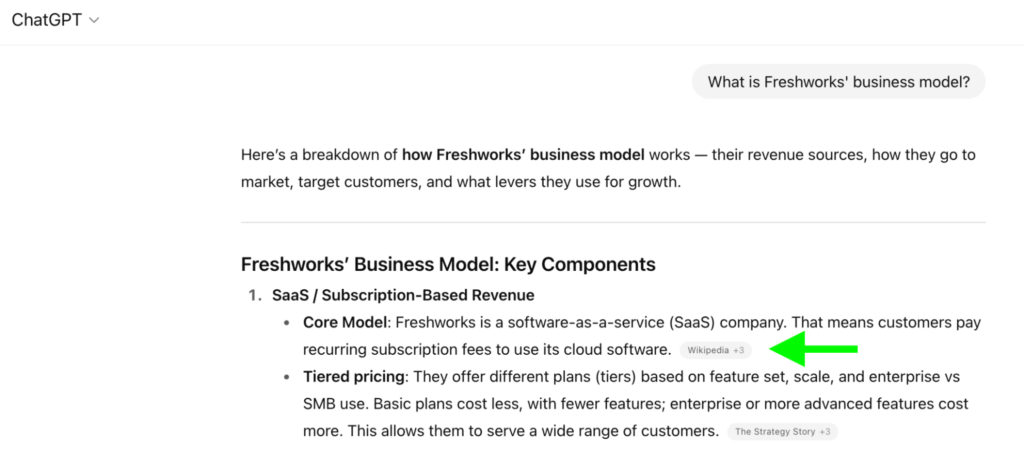
Google AI Overview
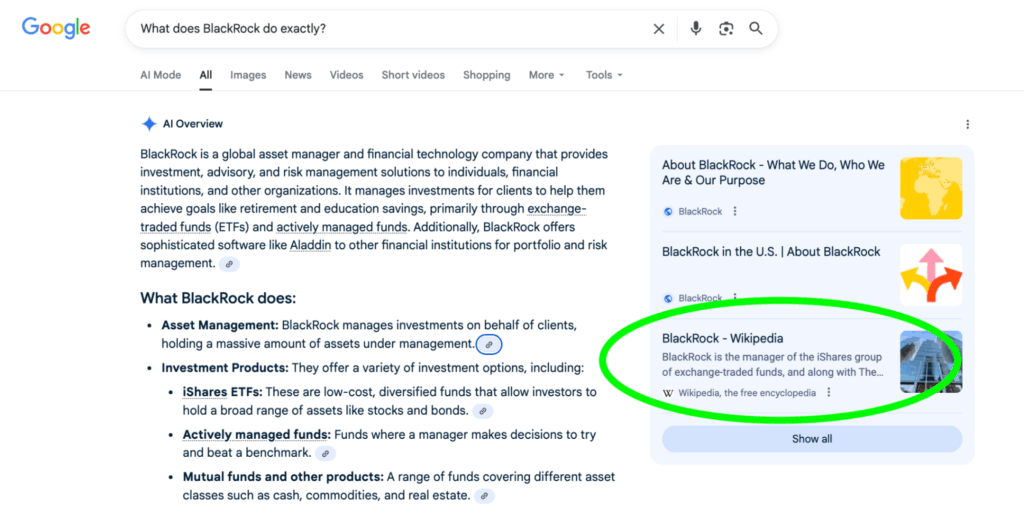
Google AI Mode
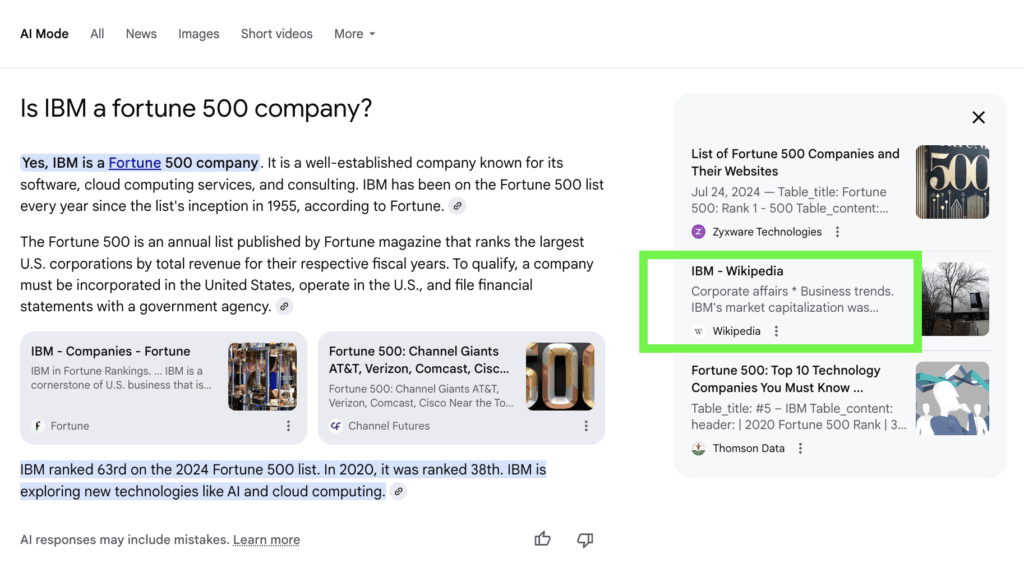
Perplexity
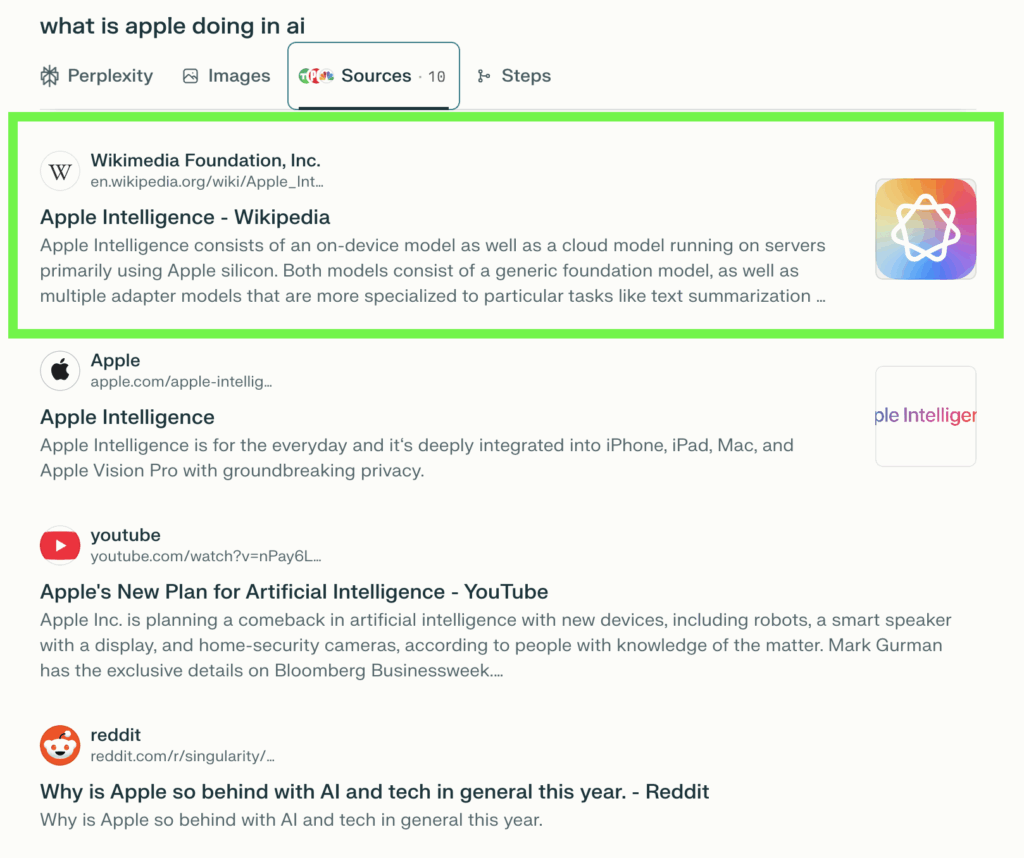
Strategic Approaches for Brands
If you’ve decided that your AI presence needs some help, how exactly do you approach Wikipedia?
Optimizing Wikipedia for AI search isn’t about barreling in, ready to copy+paste your latest news releases and official corporate history. It’s about managing your brand’s knowledge footprint in alignment with Wikipedia’s guidelines and standards.
Here’s how some of these standards affect content:
- Wikipedia is an encyclopedia: It is NOT a press release or a sponsored byline. It is for high-level facts.
- Wikipedia is written from a neutral point of view: In order to keep things neutral, and neither positively nor negatively biased, Wikipedia strongly discourages anyone writing about themselves, their family, friends, clients, employers, or other relationships. If you have a conflict of interest (COI) and want to contribute, use the Wikipedia article talk pages. (We have an entire guide for that right here.)
- Wikipedia is free content that anyone can use, edit, and distribute: This means that each page will have multiple editors with different opinions as to what content should be included and how it should be drafted.
- Wikipedia’s editors should treat each other with respect and civility: On the one hand, this implies a willingness to follow the rules and learn how to properly use Wikipedia. On the other hand, it lets you know that not following this guideline can see you blacklisted and possibly even banned.
- Wikipedia has no firm rules (but instead has policies and guidelines that are not carved in stone): Because so many different people use Wikipedia, there is an understanding that guidelines can be interpreted differently at different times. Wikipedia has designed multiple ways for people to ask questions and work with one another so that each article reflects a balanced, neutral consensus. All conversations take place in open forums and are saved forever. The same is true for every edit ever made to a Wikipedia article. There’s no hiding what’s been done (and undone) and who made the decision.
Now, keeping those community guidelines in mind, here are a few key approaches to consider when deciding how to optimize Wikipedia for AI:
- Audit existing pages: Evaluate the accuracy and depth of your company’s existing Wikipedia coverage, identify underdeveloped sections, refresh citations with recent reliable sources, and compare against competitor pages to uncover content or sourcing gaps.
- Understand your contextual footprint: Recognize where your brand or products appear across related Wikipedia topics and ensure they are accurate, neutral, and well-sourced, since these connections often shape how AI systems interpret your organization.
- Evaluate page creation thoughtfully: Consider proposing a new Wikipedia article only when it would genuinely benefit the encyclopedia, based on the existence of independent, in-depth coverage from multiple reliable sources and a clear case for notability and neutrality.
- Review all language editions: Wikipedia doesn’t only exist in English. There are editions in more than 300 languages. Brand pages can appear across language editions, and each page can have completely different copy and sourcing.
- Ongoing monitoring: Wikipedia is dynamic — and so are the AI tools pulling from it. Use Wikipedia’s built-in watchlists or third-party monitoring tools to stay ahead of edits that might affect your brand’s presence.

Strategic Resources
These Wikipedia how-to guides walk you through how to engage for the best chance of lasting success:
That’s a Wrap
Here’s what we covered today:
1. As AI reshapes how information is found and shared, Wikipedia has become a foundation that connects visibility, discoverability, and accuracy across SEO, GEO, and LLMs:
- SEO: traditional search engines like Google, Bing, and DuckDuckGo
- GEO: AI-generated summaries that appear directly within traditional search engines (think Google’s AI Overview)
- LLMs: AI tools like ChatGPT, Gemini, Perplexity, and Claude
2. Brands that strategically manage their Wikipedia presence are better positioned to:
- Influence how they’re described by AI tools
- Increase visibility across high-value search terms
- Safeguard accuracy and reputation
Want to understand how your Wikipedia presence is influencing AI visibility today? An AI audit can show you what AI tools are pulling in and where gaps lie. Ask us about it today.
The Mather Group LLC is a digital marketing agency. We specialize in enhancing online reputations through authentic content and expert digital brand management. Clients trust us with Wikipedia, GEO & SEO, LLM optimization, search reputation, and more. Don’t like how you’re showing up online? Let’s talk.


